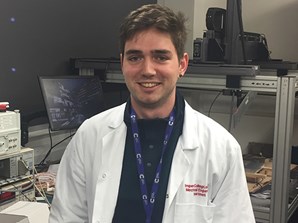George West

I am a second year PhD student in the Radiotherapy and Imaging Division at the ICR and the Mechanical Engineering department at Imperial College London. My joint PhD is part of the new Convergence Science Centre at the ICR and Imperial – bringing together researchers working across physics, data science, engineering, the biological sciences and medicine to tackle questions in cancer.
I’m working on simulations of how ultrasound travels through tissue, to aid early-response assessment of tumours to radiotherapy.
What is your educational/work background?
Before starting at the ICR I studied physics at the University of Birmingham, during which I also worked for BAE and the ICR as part of summer placement schemes.
Why did you want to study at the ICR?
During my internship at the ICR I was impressed with the friendly atmosphere and the diversity of researchers working here, with respect to both background and research interest.
The ICR seemed to me an interesting place to study alongside scientists working on a variety of projects, all with an important end goal in treatment, diagnosis or prevention of cancer.
The ICR and Imperial College London are pleased to announce that funding is available for our non-clinical Convergence Science PhD Programme. Studentships will be for four years commencing in October 2020. Applications for our cross-institutional PhD studentships are open until 11.55pm (UK time) Friday 22 November.
Apply now
Talk us through your typical day
Since my project is between Imperial and the ICR, I split my time between South Kensington and Sutton. At either site I’m working on computational problems, so I’ll spend most of my day writing code to perform simulation of ultrasound propagation and reading papers relevant to my area of research.
Occasionally I’ll go for a run at lunch or play squash, and in the evenings, you’ll find me playing music or football!
What big projects are you working on?
My PhD project is concerned with providing early assessment of tumour response to treatment. The approach I am using is to create simulations of ultrasound propagation through tissue, to calculate the attenuation and diffraction of the sound as it passes through healthy and diseased tissue.
Most of my work is concerned with using numerical simulation techniques to understand wave propagation and modelling the effect of different tissue types on ultrasound signals.
It is hoped that understanding how ultrasound propagates through tissue will allow early assessment of the efficacy of a radiotherapy treatment plan, allowing clinicians to transition a patient onto a more appropriate treatment plan, or altering the current plan to give the best outcome for the patient.
What are you most proud of?
The transfer viva/report process was a little stressful at times, so I was really happy to get through that and get some good feedback on my work.
I’m proud of the amount that I’ve learnt over the last year, I’ll look at a simulation from time to time and realise I’d have had no idea what was going on when I was starting, it’s really satisfying when your program takes a few hours to calculate everything and it comes out just how you want!
How do you take part in life at the ICR outside your studies?
I volunteer at the pH Bar in Sutton, play in the squash league, and sit on the student committee at Sutton. I also partially represent ICR and Imperial on the committee for the London cancer PhD student network.
Who do you collaborate with at the ICR and elsewhere?
Working in the convergence science centre, we work on projects at a convergent point between several different disciplines. Within the ICR I collaborate mainly with the ultrasound team, and externally I work with members of the non-destructive evaluation team at Imperial College as part of my joint PhD.
What opportunities has studying at the ICR given you?
Within the first few months of my PhD I had the opportunity to travel to Amsterdam for a training course for an Ultrasound system, and more recently I attended the IEEE international ultrasound symposium in Glasgow. Both were interesting learning experiences, and I look forward to more of them.
What’s your favourite part of life at the ICR?
I really enjoy the student community within the ICR. Everyone is very friendly, and I’ve had many an interesting discussion at the pH bar on a Friday evening. The squash league is also good fun, even if wins are few and far between.
What do you do to wind down?
In the evenings I enjoy writing music and brewing beer. I don’t enjoy anything quite as much as being on stage and playing my own music, and brewing beer is obviously a great hobby, I’m about to start brewing an oatmeal stout which should be ready in time for Christmas!